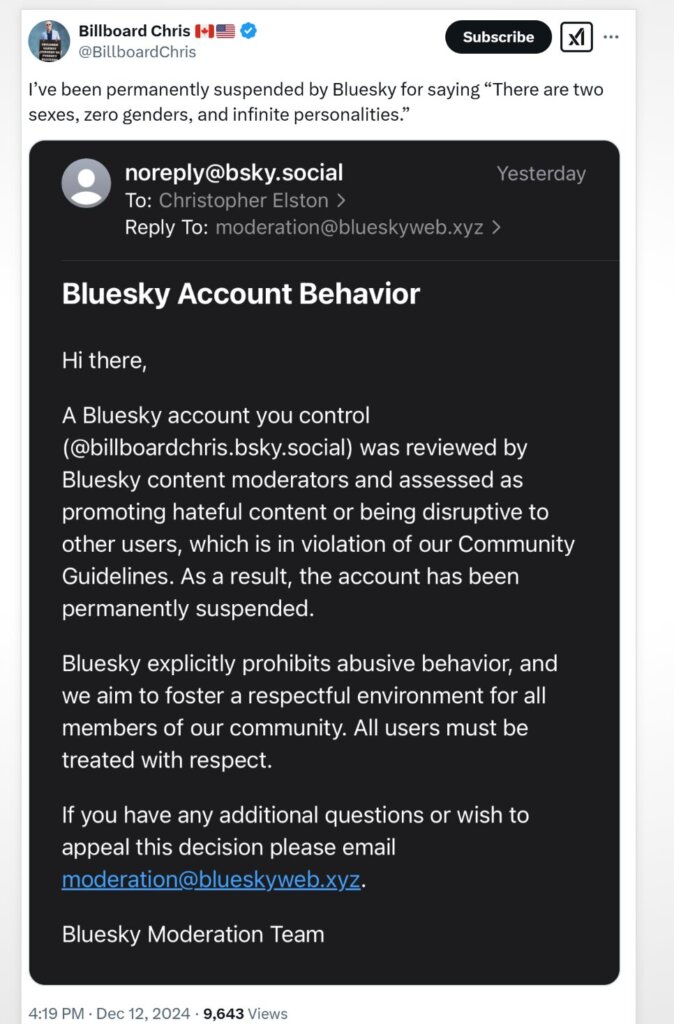

Pressing Matters
Are We Self-Segregating on Social Media?
After the election, many fled the Musk-owned X for the new Twitter-like platform, Bluesky, which has been criticized by right-wingers because they encourage civil discourse by banning trolls, bots, and other abusive users. Imagine that.
This article was made possible because of the generous support of DAME members. We urgently need your help to keep publishing. Will you contribute just $5 a month to support our journalism?
If you went to a local restaurant expecting wait staff to bring you food and drinks, and instead a monkey screamed at you and threw its own poop, you would leave.
That’s what thousands of people have done in the wake of the 2024 Election, abandoning Elon Musk’s X and other algorithm-based social sites that force-feed unwanted content, harassment, and disinformation past any safety or security measures they promise users.
Anger over Musk’s and Mark Zuckerberg’s vocal support for President Donald Trump, coupled with miserable user experiences on X, Instagram, and Threads prompted a migration to BlueSky. Modeled after early Twitter, with a chronological feed and no sponsored content (yet), BlueSky launched in 2023 but had growth of more than 11 million users since November.
With that user growth, mostly from liberals disgusted with Musk’s nonstop promotion of conservative disinformation, came criticism that people were merely seeking out an ideological “echo chamber” to reinforce their views.
Writing in the Financial Times, British journalist Jemima Kelly characterized people fleeing what had become an online Nazi bar as something akin to laziness.
An even more fundamental problem is that nobody on Bluesky seems to actually mind that they are in an echo chamber. When I told a friend, who happens to be an enthusiastic Bluesky user, what I was writing about this week, she replied, “Oh yes, but it is an echo chamber, that’s what people like about it, it’s lovely.”
Politico’s Michael Kruse complained about social media “silo-ing” ruining people’s ability to converse with one another civilly across differences.
I worry as a citizen about these separate and separating silos we’ve engineered—the ongoing and accelerating on-screen manifestation of our warring, dispiriting state of play. We have to be able to understand each other, and listen to each other, and talk to each other—have to—or else.
There is a very real danger in getting all of one’s information filtered through one social media outlet, of course. You cannot follow every reporter, or even every news outlet, on X or Facebook or TikTok reliably enough to get the kind of generalized understanding of the world once provided by, say, a nightly TV newscast.
But that’s not what these commentators are complaining about. They’re not concerned you might miss out on a proposed solution to a tax loophole or a change in water reclamation rates if you don’t follow your local government or regional newspaper online. They are throwing a fit because they can’t express hate speech.

They’re complaining that Americans are underexposed to fresh new ideas like “non-white races are inferior” and “trans people shouldn’t exist” and “we should hunt the poor for sport” and without algorithmic pressure will suffer without such content. They’re upset that they’re not allowed to promote their toxic work into the eyeballs of people who aren’t looking for it.
Manufactured outrage is big business, after all, and they don’t want to lose a paycheck.
And for all the carping about “safe spaces,” for many people, the phrase is literal. The most vulnerable people under the present regime are also the ones being targeted online in spaces like X: Trans users were far more likely to be harassed, dead-named and doxxed there, and the platform announced it wouldn’t be enforcing its policy against such conduct.
Posts from Black users on X were more than twice as likely to be flagged as “hate speech,” even before Musk’s takeover, and female users were subject to threats, including rape and death threats, on a regular basis. For members of those groups, an “echo chamber” that doesn’t include risking their entire identities just to post their thoughts on current events is likely more than welcome.
Social networks have strayed so far from their original purpose, which was to connect people with one another over shared interests or goals. People choosing with whom they interact online doesn’t create “echo chambers,” it creates social circles, virtual places to gather and converse. But in the past decade we’ve become inured to corporations using those spaces to advertise to us, and bad-faith political actors taking them over to divide and outrage us.
Getting back to that original purpose, there’s no obligation to stay where you find nothing useful or interesting, and there’s no homework assignment that requires you to allow people to ruin your experience. You’re not required to spend a certain number of hours a day engaging with hateful people, or even people you just dislike, in order to accumulate Intellectual Diversity Points.
There’s still plenty of conservative content on BlueSky, even if you curate your feed to read mostly people dunking on it. There’s just no pushing that content on people who don’t want it, and if someone gets out of line, they can be definitively blocked.
As the writer John Scalzi put it, “It’s a neighborhood cookout in my backyard. Everyone’s invited and welcome, but the second you act like a shithead to me or our neighbors, I throw you over the fence into the gully.”
If someone prizes exposure to opposing views, they’re not prevented from seeking those out. American media is not short on opportunities to engage with conservatives. Major newspaper op-eds, entire cable networks, magazines and newsletters platform right-wing writers nonstop. The entire federal government is run by fascist goons spewing lies from every single lectern they occupy.
Rarely has one ideology so dominantly controlled the information apparatus of the country. That doesn’t make another social network a “safe space” or an “echo chamber.” It makes BlueSky and other nascent networks a necessity.
Before you go, we hope you’ll consider supporting DAME’s journalism.
Today, just tiny number of corporations and billionaire owners are in control the news we watch and read. That influence shapes our culture and our understanding of the world. But at DAME, we serve as a counterbalance by doing things differently. We’re reader funded, which means our only agenda is to serve our readers. No both sides, no false equivalencies, no billionaire interests. Just our mission to publish the information and reporting that help you navigate the most complex issues we face.
But to keep publishing, stay independent and paywall free for all, we urgently need more support. During our Spring Membership drive, we hope you’ll join the community helping to build a more equitable media landscape with a monthly membership of just $5.00 per month or one-time gift in any amount.


















































































